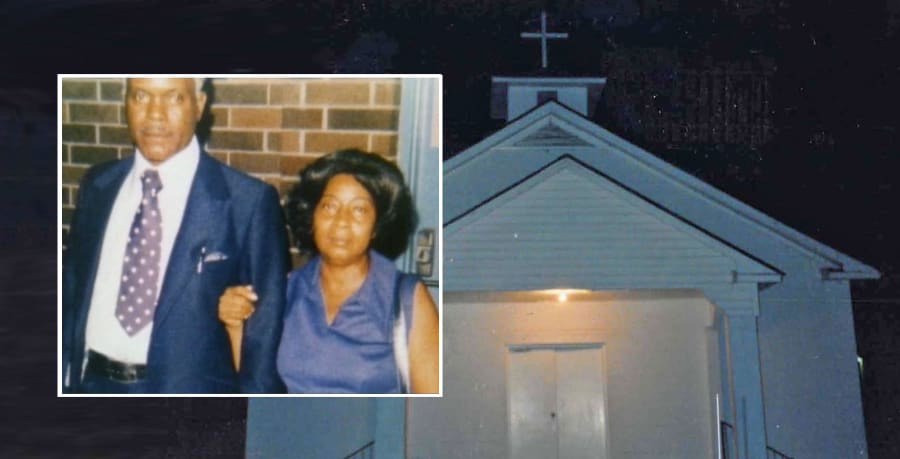KINGSLAND, Ga. – A hearing is set for July to decide whether a man convicted in killing a husband and wife in a Camden County church 35 years ago will get a new trial based on new DNA evidence and information that a tipster in the case may have been bribed.
In 2003, Dennis Perry was convicted of killing Deacon Harold Swain and his wife, Thelma, inside the Rising Daughter Baptist Church in Waverly. The Swains were among several people attending Bible study at the church that evening in 1985.
A witness who does not want to be identified more than 35 years later is still afraid to speak publicly.
“I didn’t really look at him. I know he was a white guy. He had blonde-looking hair to me,” explained the witness.
The police report detailing what happened said a man came to the church asking to speak with Deacon Swain.
“Mr. Harold got up and said, ‘I wonder what he wants with me?’” explained the witness.
The report states Swain met the suspect at the entrance of the church within the vestibule.
“Then we heard a little scuffling out there and the next we heard the gun. Pow, pow, pow,” explained the witness.
News4Jax has covered the crimes since 1985, at the time, speaking to Vanzola Williams -- another witness inside the church.
“And before I could get the car door open, I heard the shots, four shots,” Williams said.
The gunman killed Swain as she ran to help her husband.
“I just don’t want to believe that it has really happened,” explained Marjorie More, a third witness. “It’s one of those things you see happen, but you don’t want to believe it happened.”

According to court documents, on the night of the murders, the phone line to the church was cut.
“We said, ‘We can’t stay in this church all night.’ We thought he was going to come get us. We sneaked out the side door, we were going to run through the cemetery, we were going to try to help, it was probably my mind playing, but it was like we heard footsteps or people walking on leaves, so we weren’t able to run for help, so we ran back in,” explained the unnamed witness. “I was scared for a long time.”
Investigators found shell casings, shirt buttons, a severed phone line and eyeglasses with three hairs belonging to a white person at the crime scene. Sketches led to hundreds of potential suspects, investigated by the state over 18 years.
One year after the murders, Erik Sparre was arrested. Frank Head, Sparre’s former father-in-law, shared with investigators a recording of Sparre bragging that he killed two people in a church. Emily Head, Sparre’s ex-wife, identified the glasses found at the church and stated that they looked like the ones Erik Sparre had, according to court records. But investigators did not find any other physical evidence connecting Erik Sparre to the crime and eventually let him go.
In 2000, 15 years after the murders, police arrested Perry based on testimony from a single tipster who happened to be the mother of Perry’s ex-girlfriend. Court documents show, the chief investigators during the first several years of the investigation, confirmed and documented Perry’s alibi: He was at work in the Atlanta area on the day of the murders and could not have made it to Waverly in time to be present at the crime scene.
An eye exam determined Perry had 20/20 vision in each eye. DNA evidence collected from the hairs found on the glasses had excluded Perry as a contributor.
“The prosecution is supposed to disclose all evidence which may help the defense, and of course all evidence that may hurt the defense, in other words all evidence would be in their possession. That’s the law. But apparently, they didn’t disclose all of the evidence to us at the time.” explained Dale Westling, who was Perry’s attorney at the time of trial.
Perry and his wife, Brenda, married in January 2009. Two years after, she started visiting him regularly in prison. She said the two have known each other for years but did not tie the knot until years after he was convicted.
“Being married to Dennis has been a life fulfilled,” she said.
In 2003, a judge sentenced Perry to life in prison. Since Perry’s conviction, the Georgia Innocence Project and Perry’s attorneys at the King & Spalding law firm discovered the tipster who told investigators that Perry killed the Swains, was paid $12,000 for her role in the prosecution.
In February, Erik Sparre’s mother voluntarily gave a DNA sample to Georgia Innocence Project investigators. The DNA was compared to hairs found on the eyeglasses at the scene more than 35 years ago. It was a match. A lab concluded the hairs could have only come from less than half of 1% of the U.S. population and Sparre was in that grouping.
In April, attorneys for Perry, who is now 58 and behind bars for 20 years, filed a motion asking for a new trial based on that DNA evidence pointing to Sparre. Last week, the Georgia Bureau of Investigation announced it was reopening the case.
No one answered when News4Jax went to Sparre’s home in Waynesville, Georgia.
Miles away, behind that quiet and quaint church along U.S. 17 between Waverly and I-95, rest the Swains -- buried just feet away from a mystery and a tragedy, that’s never been resolved.



